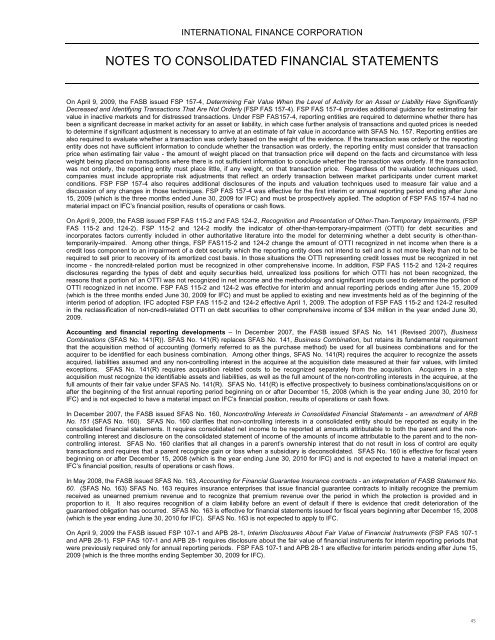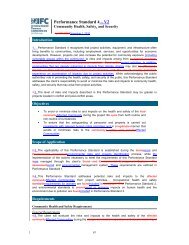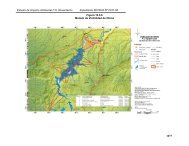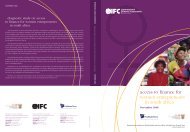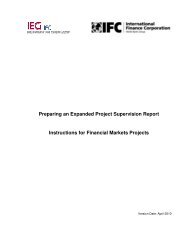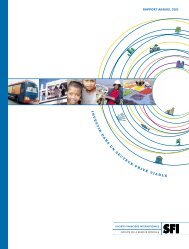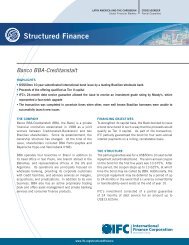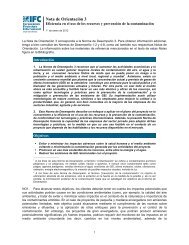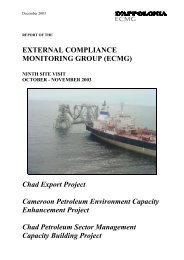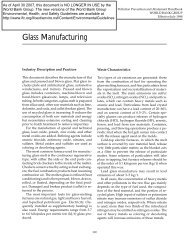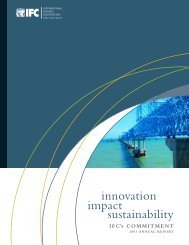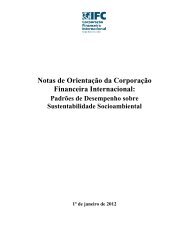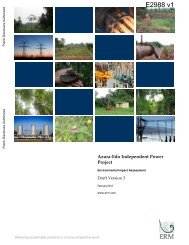Volume 2 - IFC
Volume 2 - IFC
Volume 2 - IFC
You also want an ePaper? Increase the reach of your titles
YUMPU automatically turns print PDFs into web optimized ePapers that Google loves.
INTERNATIONAL FINANCE CORPORATION<br />
NOTES TO CONSOLIDATED FINANCIAL STATEMENTS<br />
On April 9, 2009, the FASB issued FSP 157-4, Determining Fair Value When the Level of Activity for an Asset or Liability Have Significantly<br />
Decreased and Identifying Transactions That Are Not Orderly (FSP FAS 157-4). FSP FAS 157-4 provides additional guidance for estimating fair<br />
value in inactive markets and for distressed transactions. Under FSP FAS157-4, reporting entities are required to determine whether there has<br />
been a significant decrease in market activity for an asset or liability, in which case further analysis of transactions and quoted prices is needed<br />
to determine if significant adjustment is necessary to arrive at an estimate of fair value in accordance with SFAS No. 157. Reporting entities are<br />
also required to evaluate whether a transaction was orderly based on the weight of the evidence. If the transaction was orderly or the reporting<br />
entity does not have sufficient information to conclude whether the transaction was orderly, the reporting entity must consider that transaction<br />
price when estimating fair value - the amount of weight placed on that transaction price will depend on the facts and circumstance with less<br />
weight being placed on transactions where there is not sufficient information to conclude whether the transaction was orderly. If the transaction<br />
was not orderly, the reporting entity must place little, if any weight, on that transaction price. Regardless of the valuation techniques used,<br />
companies must include appropriate risk adjustments that reflect an orderly transaction between market participants under current market<br />
conditions. FSP FSP 157-4 also requires additional disclosures of the inputs and valuation techniques used to measure fair value and a<br />
discussion of any changes in those techniques. FSP FAS 157-4 was effective for the first interim or annual reporting period ending after June<br />
15, 2009 (which is the three months ended June 30, 2009 for <strong>IFC</strong>) and must be prospectively applied. The adoption of FSP FAS 157-4 had no<br />
material impact on <strong>IFC</strong>’s financial position, results of operations or cash flows.<br />
On April 9, 2009, the FASB issued FSP FAS 115-2 and FAS 124-2, Recognition and Presentation of Other-Than-Temporary Impairments, (FSP<br />
FAS 115-2 and 124-2). FSP 115-2 and 124-2 modify the indicator of other-than-temporary-impairment (OTTI) for debt securities and<br />
incorporates factors currently included in other authoritative literature into the model for determining whether a debt security is other-thantemporarily-impaired.<br />
Among other things, FSP FAS115-2 and 124-2 change the amount of OTTI recognized in net income when there is a<br />
credit loss component to an impairment of a debt security which the reporting entity does not intend to sell and is not more likely than not to be<br />
required to sell prior to recovery of its amortized cost basis. In those situations the OTTI representing credit losses must be recognized in net<br />
income - the noncredit-related portion must be recognized in other comprehensive income. In addition, FSP FAS 115-2 and 124-2 requires<br />
disclosures regarding the types of debt and equity securities held, unrealized loss positions for which OTTI has not been recognized, the<br />
reasons that a portion of an OTTI was not recognized in net income and the methodology and significant inputs used to determine the portion of<br />
OTTI recognized in net income. FSP FAS 115-2 and 124-2 was effective for interim and annual reporting periods ending after June 15, 2009<br />
(which is the three months ended June 30, 2009 for <strong>IFC</strong>) and must be applied to existing and new investments held as of the beginning of the<br />
interim period of adoption. <strong>IFC</strong> adopted FSP FAS 115-2 and 124-2 effective April 1, 2009. The adoption of FSP FAS 115-2 and 124-2 resulted<br />
in the reclassification of non-credit-related OTTI on debt securities to other comprehensive income of $34 million in the year ended June 30,<br />
2009.<br />
Accounting and financial reporting developments – In December 2007, the FASB issued SFAS No. 141 (Revised 2007), Business<br />
Combinations (SFAS No. 141(R)). SFAS No. 141(R) replaces SFAS No. 141, Business Combination, but retains its fundamental requirement<br />
that the acquisition method of accounting (formerly referred to as the purchase method) be used for all business combinations and for the<br />
acquirer to be identified for each business combination. Among other things, SFAS No. 141(R) requires the acquirer to recognize the assets<br />
acquired, liabilities assumed and any non-controlling interest in the acquiree at the acquisition date measured at their fair values, with limited<br />
exceptions. SFAS No. 141(R) requires acquisition related costs to be recognized separately from the acquisition. Acquirers in a step<br />
acquisition must recognize the identifiable assets and liabilities, as well as the full amount of the non-controlling interests in the acquiree, at the<br />
full amounts of their fair value under SFAS No. 141(R). SFAS No. 141(R) is effective prospectively to business combinations/acquisitions on or<br />
after the beginning of the first annual reporting period beginning on or after December 15, 2008 (which is the year ending June 30, 2010 for<br />
<strong>IFC</strong>) and is not expected to have a material impact on <strong>IFC</strong>’s financial position, results of operations or cash flows.<br />
In December 2007, the FASB issued SFAS No. 160, Noncontrolling Interests in Consolidated Financial Statements - an amendment of ARB<br />
No. 151 (SFAS No. 160). SFAS No. 160 clarifies that non-controlling interests in a consolidated entity should be reported as equity in the<br />
consolidated financial statements. It requires consolidated net income to be reported at amounts attributable to both the parent and the noncontrolling<br />
interest and disclosure on the consolidated statement of income of the amounts of income attributable to the parent and to the noncontrolling<br />
interest. SFAS No. 160 clarifies that all changes in a parent’s ownership interest that do not result in loss of control are equity<br />
transactions and requires that a parent recognize gain or loss when a subsidiary is deconsolidated. SFAS No. 160 is effective for fiscal years<br />
beginning on or after December 15, 2008 (which is the year ending June 30, 2010 for <strong>IFC</strong>) and is not expected to have a material impact on<br />
<strong>IFC</strong>’s financial position, results of operations or cash flows.<br />
In May 2008, the FASB issued SFAS No. 163, Accounting for Financial Guarantee Insurance contracts - an interpretation of FASB Statement No.<br />
60. (SFAS No. 163) SFAS No. 163 requires insurance enterprises that issue financial guarantee contracts to initially recognize the premium<br />
received as unearned premium revenue and to recognize that premium revenue over the period in which the protection is provided and in<br />
proportion to it. It also requires recognition of a claim liability before an event of default if there is evidence that credit deterioration of the<br />
guaranteed obligation has occurred. SFAS No. 163 is effective for financial statements issued for fiscal years beginning after December 15, 2008<br />
(which is the year ending June 30, 2010 for <strong>IFC</strong>). SFAS No. 163 is not expected to apply to <strong>IFC</strong>.<br />
On April 9, 2009 the FASB issued FSP 107-1 and APB 28-1, Interim Disclosures About Fair Value of Financial Instruments (FSP FAS 107-1<br />
and APB 28-1). FSP FAS 107-1 and APB 28-1 requires disclosure about the fair value of financial instruments for interim reporting periods that<br />
were previously required only for annual reporting periods. FSP FAS 107-1 and APB 28-1 are effective for interim periods ending after June 15,<br />
2009 (which is the three months ending September 30, 2009 for <strong>IFC</strong>).<br />
45


